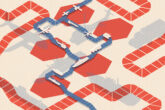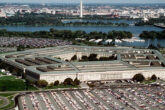August 23, 2021
Robert D. Kaplan on why America can recover from failures like Afghanistan and Iraq
There they were in the flesh: wizened veterans of the Spanish-American War from 1898 marching a few feet away from me at the Memorial Day parade on Eastern Parkway in Brooklyn in 1958. It is one of my earliest and most vivid childhood memories. The Spanish-American War, which began in Cuba and led to a bloody and drawn-out American occupation of the Philippines, announced the arrival of the United States as a world power.
The basis of that power was starkly geographical. Hans Morgenthau, a founding father of “realism” in international relations, called geography the most stable component of national power. America is a vast and wealthy continent densely connected by navigable rivers and with an economy of scale, accessible to the main sea lines of communication, yet protected by oceans from the turmoil of the Old World.
Stories about American decline are overrated.
And that geography still matters, despite technology having shrunk the globe. Notwithstanding the pathologies of this tighter, more interconnected world—terrorism, viral pandemics, ransomware—America, unlike China, is self-sufficient in hydrocarbons. It has abundant water resources and no powerful and hostile neighbors. The southern border, which American conservatives wail about, involves only poor migrants, and not the soldiers of two armies facing each other like on China’s southern frontier with India.
That geography helps explain why America can miscalculate and fail in successive wars, yet completely recover, unlike smaller and less well-situated countries which have little margin for error. Thus, stories about American decline are overrated. Geography has bequeathed America such power and with such protection that, integrated into an increasingly smaller world as it is, the country cannot help but remain in an imperial-like situation, with far-flung economic and military commitments around the world.
Read the full story and more from The Economist.
More from CNAS
-
The Department of Defense’s Breakthrough Nuclear Moment Risks Slipping Away
Unless they act, the Department of Defense’s breakthrough nuclear moment may vanish before it really happens....
By Will Rogers
-
DEFAERO Strategy Series [Apr 09, 25] CNAS' Becca Wasser and Phil Sheers on Revitalizing the U.S. Defense Industrial Base
On this episode of the Defense & Aerospace Report Strategy Series, sponsored by General Atomics Aeronautical Systems, Becca Wasser and Phil Sheers of the Center for a New Amer...
By Becca Wasser & Philip Sheers
-
From Production Lines to Front Lines
Executive Summary The U.S. defense industrial base (DIB) is struggling to meet the demands of the current strategic environment—let alone prepare for a potential conflict agai...
By Becca Wasser & Philip Sheers
-
The Pentagon’s Endangered Brain Trust
In this environment, sound assessments of emerging threats and new ideas to counter them will be especially vital....
By Dr. Andrew Krepinevich, Jr.




